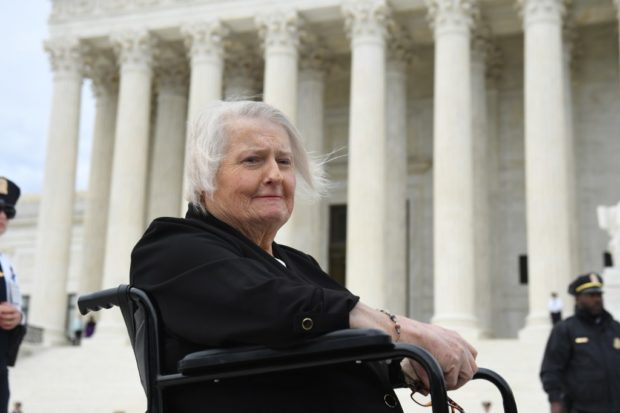
In this file photo Transgender activist Aimee Stephens, sits in her wheelchair outside the US Supreme Court in Washington, DC, October 8, 2019, as the Court holds oral arguments in three cases dealing with workplace discrimination based on sexual orientation. Aimee Stephens, who filed the first case of transgender rights that reached the US Supreme Court, died on Tuesday just as the high court is set to render a decision on her case. Stephens, 59, died at her home in Detroit, Michigan, in the company of her wife Donna, the American Civil Liberties Union said in a statement. Photo by SAUL LOEB / AFP
WASHINGTON — Aimee Stephens, who filed the first case of transgender rights that reached the US Supreme Court, died on Tuesday just as the high court is set to render a decision on her case.
Stephens, 59, died at her home in Detroit, Michigan, in the company of her wife Donna, the American Civil Liberties Union said in a statement.
“Aimee did not set out to be a hero and a trailblazer, but she is one, and our country owes her a debt of gratitude for her commitment to justice for all people and her dedication to our transgender community,” said Chase Strangio, an ACLU official and a member of Stephens’s legal team.
A cause of death was not announced, but Stephens had been suffering from severe kidney failure.
After working for six years in a funeral agency as a man, Stephens announced to her employer that she would transition to become a woman.
Her boss, a self-described “fervent Christian” named Thomas Rost, fired Stephens, arguing that he did not want to disturb the mourning of his clients by the sex change.
Stephens soon filed a discrimination lawsuit. After losing in a lower court, she won on appeal — and her former employer took the case to the Supreme Court.
At an October 8 hearing, Rost received support from US President Donald Trump’s administration, which argued that the federal law prohibiting sexual discrimination applies only to “biological” sex, and not to identity or sexual orientation.
Along with the Stephens case, the Supreme Court looked at the case of two fired gay people.
A ruling, which could affect the rights of millions of workers, is expected before the end of June.